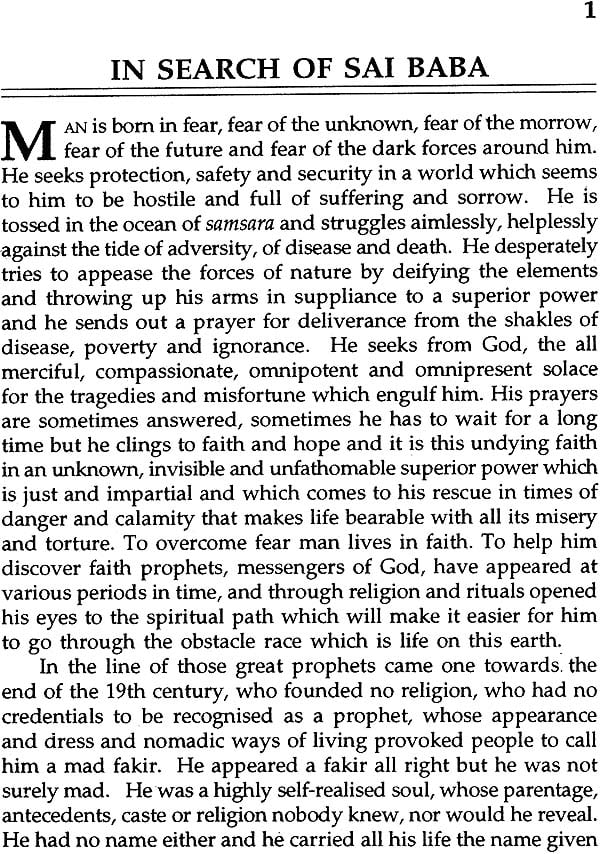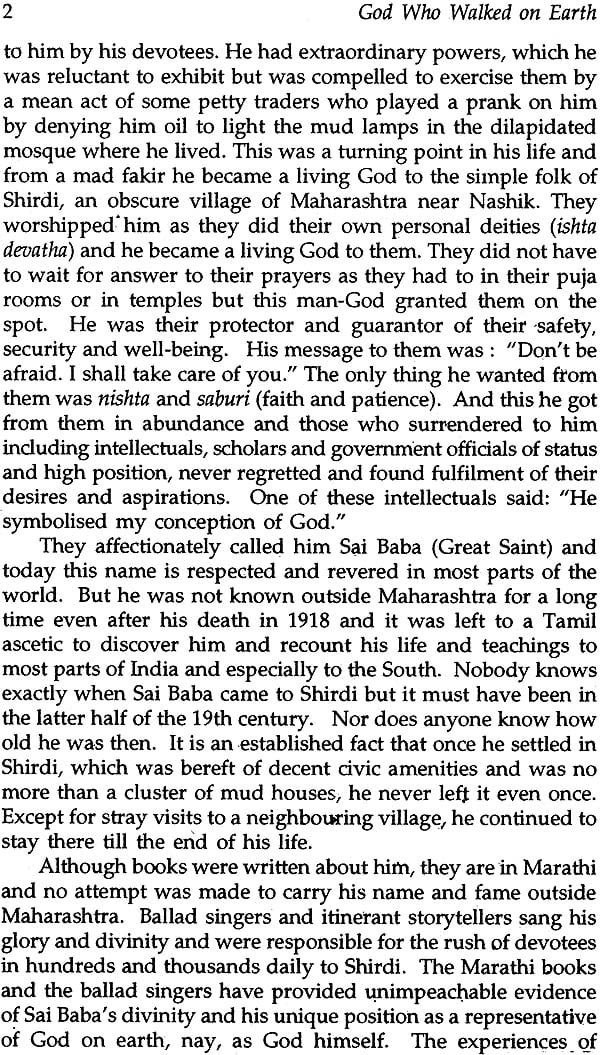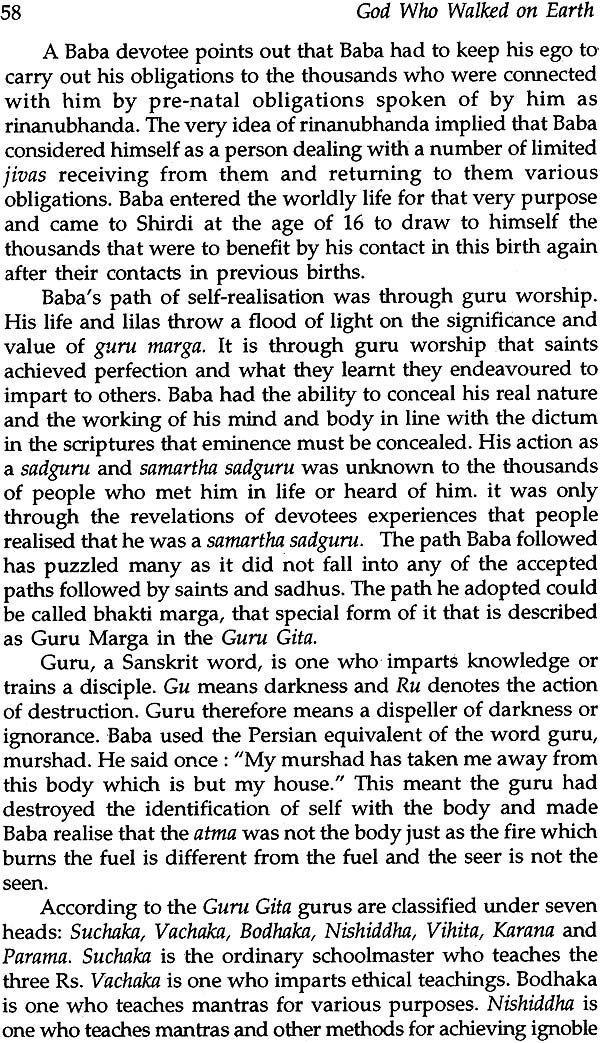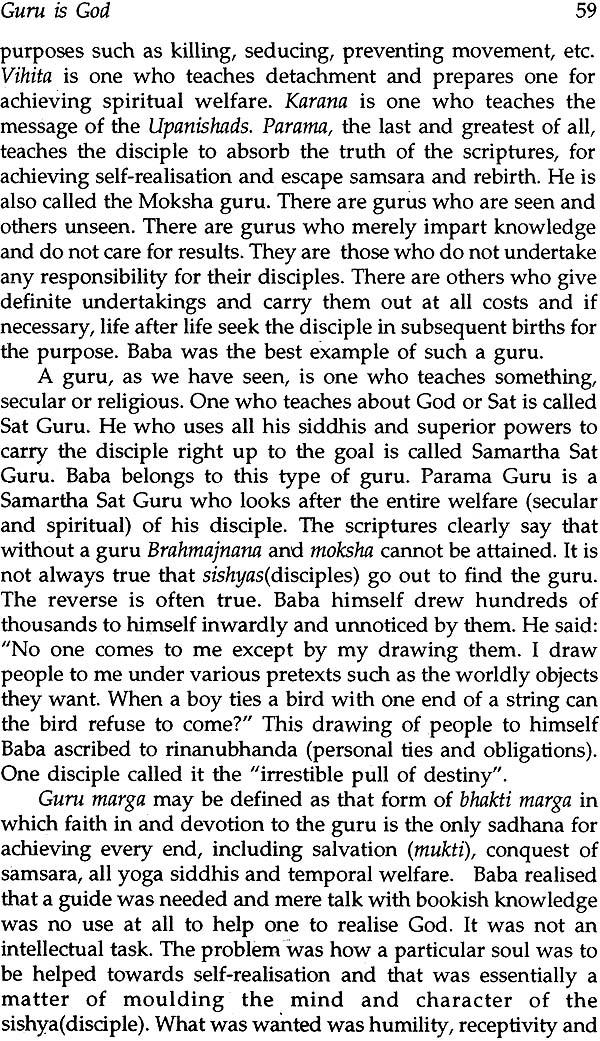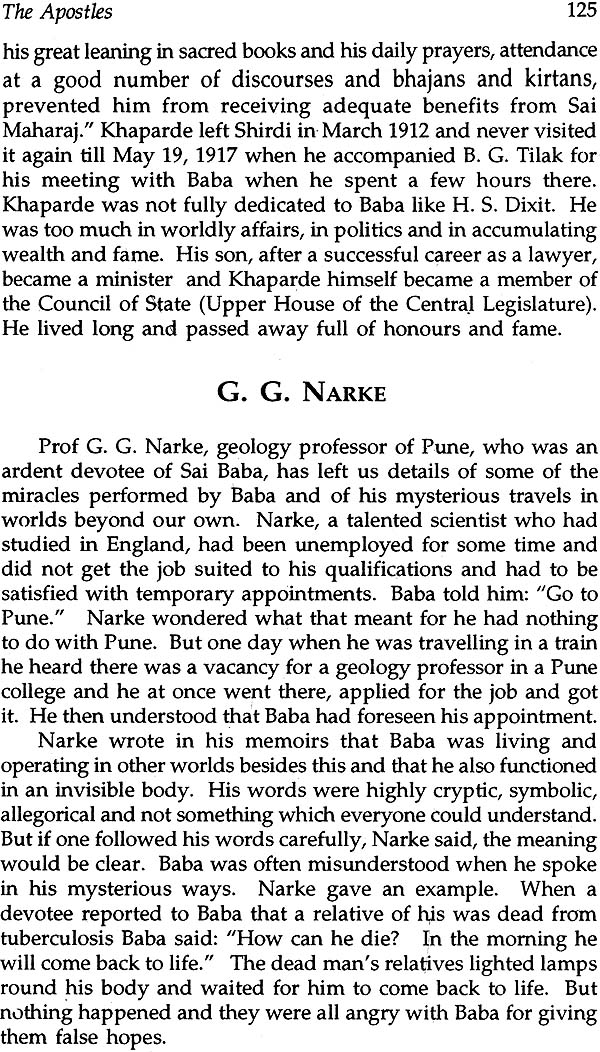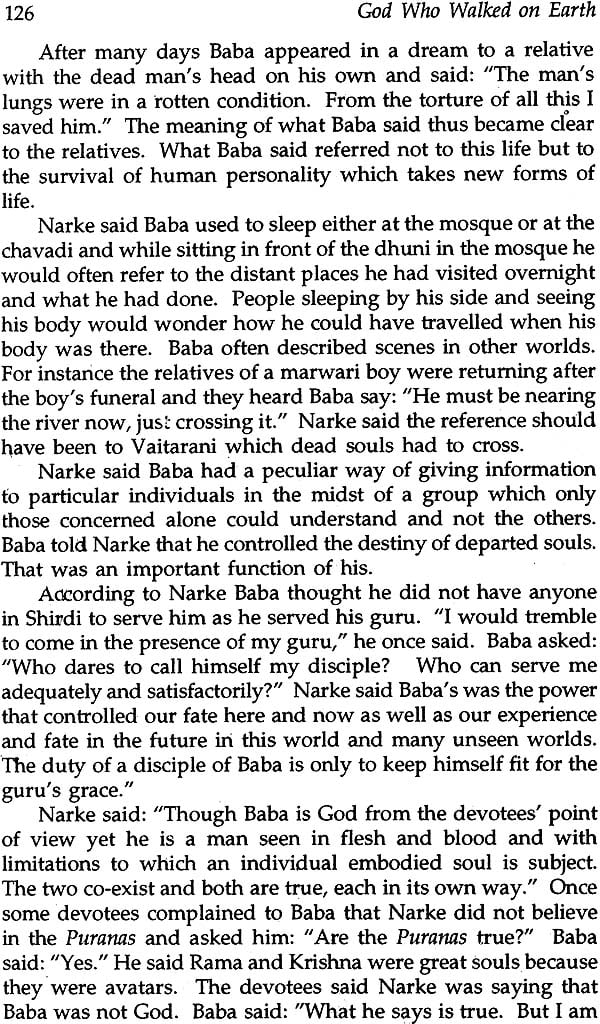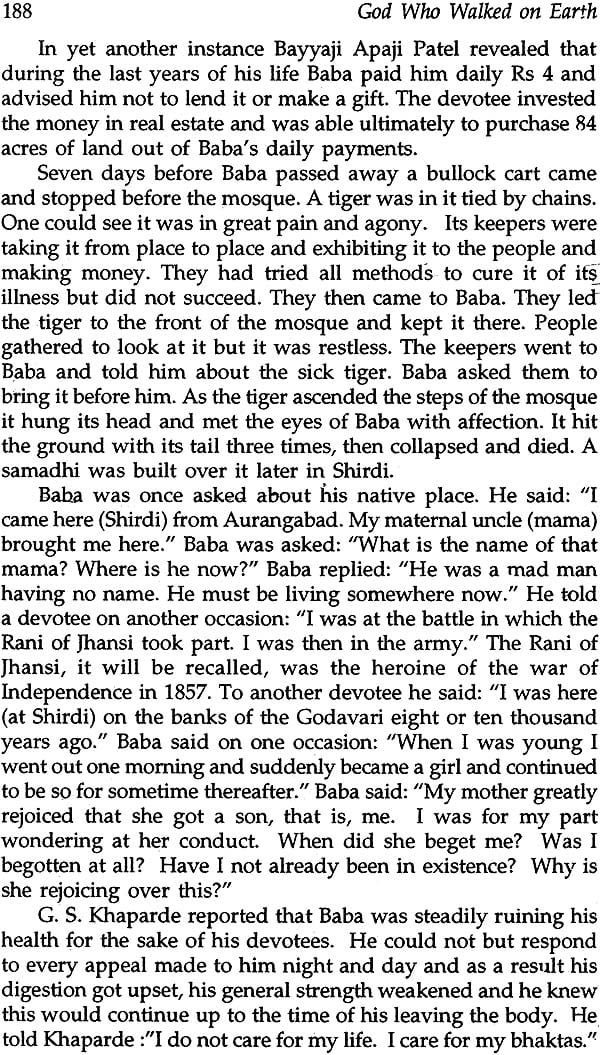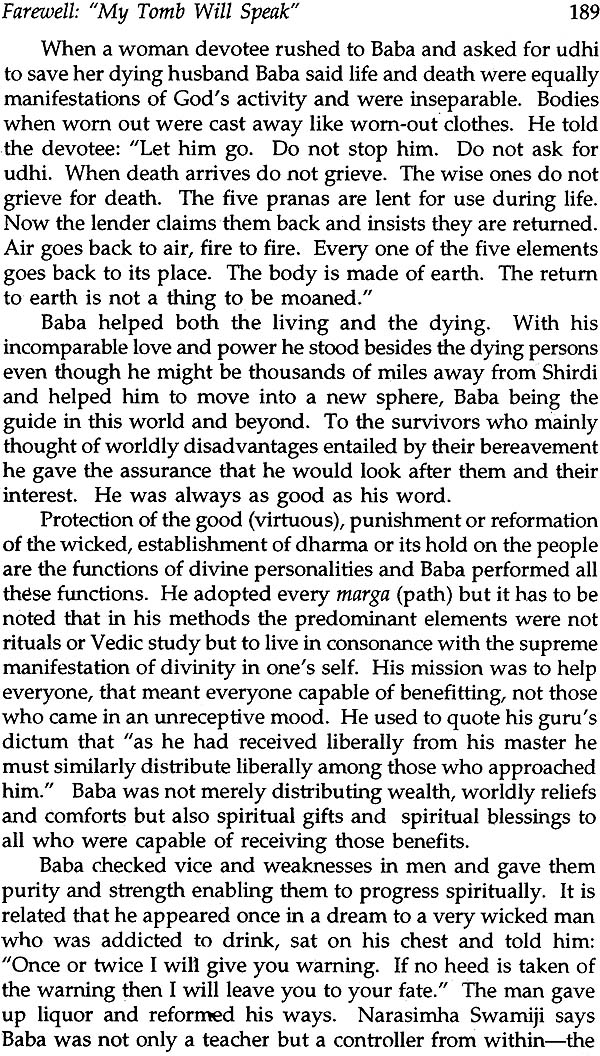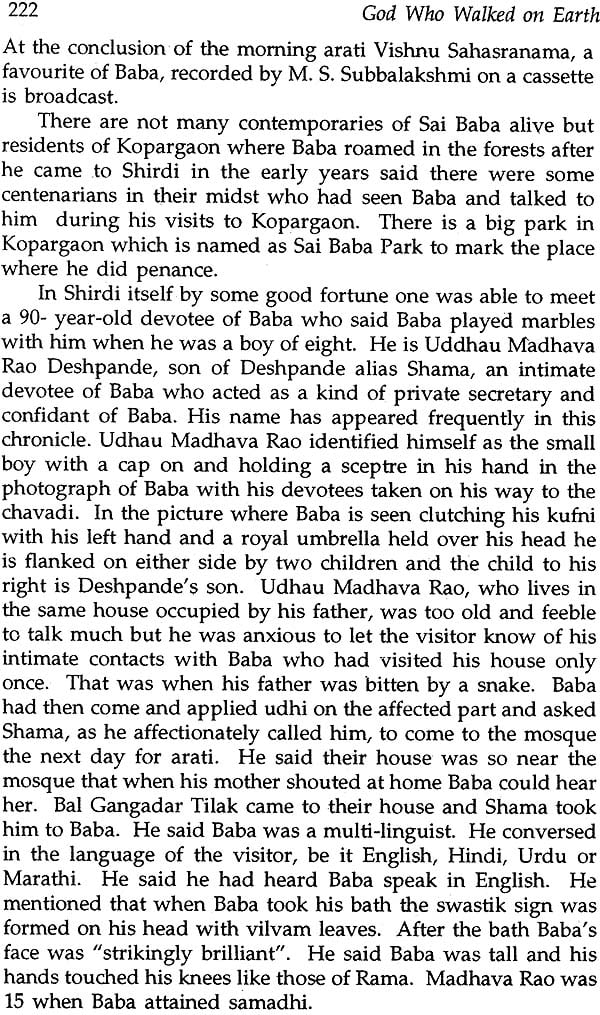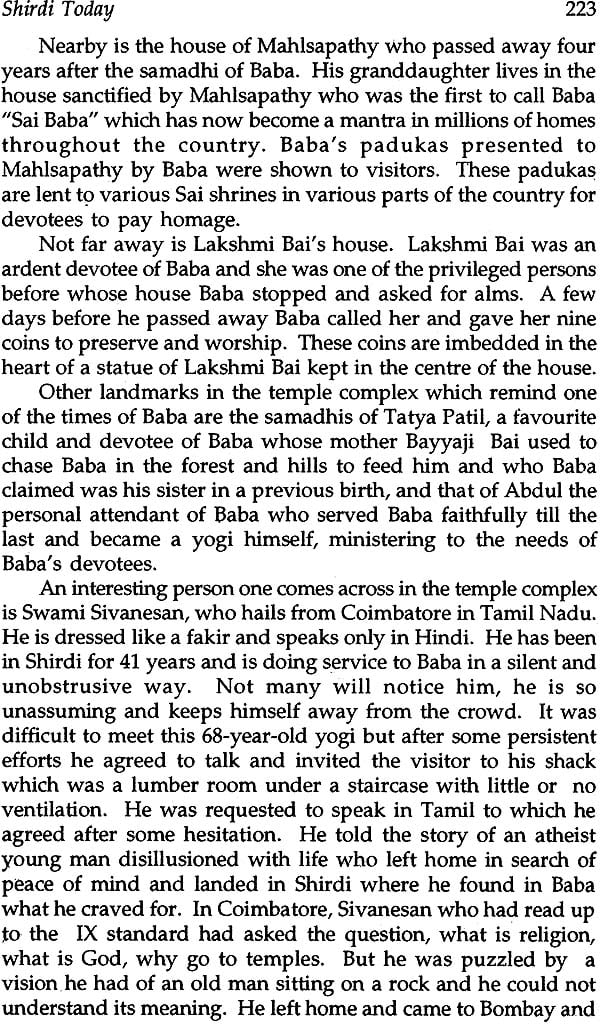
God Who Walked On Earth: The Life and Times of Shirdi Sai Baba
Book Specification
| Item Code: | IDE575 |
| Author: | Rangaswami Parthasarathy |
| Publisher: | Sterling Publishers Pvt. Ltd. |
| Language: | English |
| Edition: | 2011 |
| ISBN: | 9788120718098 |
| Pages: | 238 |
| Cover: | Paperback |
| Other Details | 8.5" X 5.5" |
| Weight | 310 gm |
Book Description
From the Jacket:
Who was Sai Baba? Where did he come from and what was his message? How and why was he worshipped as God? Who were his disciples and how were they attracted to him? What do his devotees, numbering millions all over the country, think of his lilas, his compassion and the succour and relief he brought to them in their hour of need both before and after his samadhi?
These and many other questions are answered in this biography of a living God who charmed and captured the hearts of people of all walks of life, of all religions, rich and poor, the learned and the illiterate. Many books have been written about Sai Baba is given in simple and easy-to-understand language without omitting any aspect of Baba's life and his philosophy.
The book presents an absorbing story of a man who came to Shirdi as a fakir, was teased by children and frowned upon by sceptical villagers and remained to reign as a spiritual leader, the greatest saint of all times. He became a god who walked on earth. It is a book which every Sai devotee will like to possess as a Bible of Baba's teachings and a remembrance of the great Master whose idol or portrait adorns the pooja rooms of millions of homes throughout the country.
About the Author:
Rangaswami Parthasarathy, a journalist, retired as a Senior Assistant Editor of the Hindu, after serving the newspaper for 32 years. He wrote the history of the Hindu titled Hundred Years of the Hindu which was released during the centenary celebrations of the paper in 1978. He subsequently wrote Memoirs of a News Editor describing his experiences as a News Editor of the Hindu for over 12 years. He has also written three more books on journalism, Basic Journalism, Journalism in India and Here is the News: Reporting for the Media. Apostle of Love, Saint Saipadananda, which he wrote in 1981, is a biography of Sri Radhakrishna Swamiji, his guru, and a great devotee of sai Baba of Shirdi and disciple of Sri Narasimha Swamiji. Parthasarathy has been the recipient of the N. Raghunatha Aiyer Memorial Award for Excellence in Journalism.
There are certain men and women who walk on this earth like us, but do not really belong here. It looks as though they have sojourned here for the sake of the suffering human beings, to bring them solace and peace and to show them the way, the way to light and blessedness. They are the salt of this earth- the great sages, saints and seers. The Saint of Shirdi, Sri Sai Baba as he is lovingly called by thousands of his devotees, was a jewel among such holy man.
True men of God talk very little about themselves but only of God and the ways that lead to Him. Their external life appears to be rather ordinary, providing very little material to history or the biographers. But, their internal life is so intense, holy and great that they can create history. In fact, the lives of such great people alone is history in the real sense. It is a very living and dynamic history that shapes the destinies of generations of people of a society or a country.
Though very little of the early life of Sri Sai Baba is known to us, fortunately for the devotees and the spiritual aspirants, a lot of material has been meticulously gathered by his disciples and admireers. This biography- God Who Walked On Earth- by Sri Rangaswami Parathasarathy, is one such, which perhaps supersedes all the previous ones. Written in a simple but captivating style, it takes the reader on a spiritual pilgrimage in the company of the Baba.
Sri Sai Baba lived like a beggar, like a true Sannyasin, till the last day of his life. Though pomp and pageantry followed him, it could never catch up with him!
His real greatness does not lie in the Superhuman miracles that he wrought but in the succor that he brought to the suffering humanity and the strength he infused in them to face the problems of life and turn towards God. His Muslim adjuncts did help in bringing about a working harmony between the Hindus and the Muslims, enlightening them both on the true aspects of religion, as life and God-experience.
His teachings do not reflect anything new. But the way he delivered them, depending upon the context and the persons, have acquired power.
Today Sri Sai Baba of Shirdi is fairly well known. But, not many know the relevant details of his life, doings and teachings. This book fulfills that need, thereby helping the mortals to take one more step towards immortality.
I came to known about Sai Baba of Shirdi through my guru, Radhakrishna Swamiji, who in turn became his ardent devotee through his guru, Narasimha Swamiji, the person responsible for discovering Sai Baba for his countrymen outside Maharashtra. It is an amazing fact that this man of God, who was worshipped as God by hundreds and thousands of people, was little known outside Maharashtra where he lived in a small unheard of village called Shirdi. Intellectuals, officials and the elite in society flocked to him, fell at his feet and proclaimed him God, an avatar. But he remained secluded in Shirdi and virtually unknown outside the Bombay Presidency (as Maharashtra was then known.) In Maharashtra itself the vast multitude came to know this “Muslim” fakir through ballad singers and discourses by itinerant entertainers. The available material about Baba was scanty. It was in Marathi, and much of it a mixture of fact and fiction. The exception was Sai Satcharita by Hemadpant which is an authentic source material for the life and times of Baba. The real biographer of Baba is Narasimbha Swamiji, who in his search for a guru, after renouncing a princely life, stumbled on Baba more than 12 years after his Samadhi and surrendered to him. It became his life mission to propagate the ideals and teachings of Baba and he succeeded in this to such an extent that today there are thousands of Sai Mandirs in all parts of the country and Baba’s idol is worshipped in millions of homes. Narasimha Swamiji gathered around him a band of dedicated disciples to help him in Sai prachar and foremost among them was Radhakrishna Swamiji.
In attempting to write this book I have largely relied on the writings of Narasimha Swamiji and on Sai Satcharita. Besides Narasimha Swamiji and on Sai Satcharita. Besides Narasimha Swamiji’s prolific outpourings on Baba there are not many authentic and objective literature on Baba. My effort has been to supply a crying need in this respect and if I succeed in this task even to a small extent it will be my crowning achievement. This book could not have been written but for the inspiration and encouragement given by my brother devotee, Sri Srichand Rajpal, and I express my deep sense of gratitude to him. I wish also thank Mr Kesava Rao, President of the All India Sai Samaj, for going through the manuscript and offering valuable suggestions. My wife, who introduced me to Radhakrishna Swamiji and was very much attached to him and Baba, has given me the strength and confidence to venture on this formidable task and I thank her. My thanks are also due to Sai Venkatakrishna, who got the manuscript typed and helped in various other ways, and to Rama Ram Mohan, Lakshmi, Suchitra Madhavan, Radha Thirumalai and Usha who assisted me in getting the manuscript prepared.
| Foreword by Swami Harshananda | v | |
| Preface | vii | |
| 1. | In Search of Sai Baba | 1 |
| 2. | The Fakir from Nowhere | 15 |
| 3. | Pied Piper of Shirdi | 31 |
| 4. | Guru is God | 48 |
| 5. | Tax Collector | 64 |
| 6. | A Day with Sai Baba | 71 |
| 7. | The Apostles | 88 |
| 1. Upasani Baba | 88 | |
| 2. Mahlsapathy | 95 | |
| 3. Narayan Govind Chandorkar | 99 | |
| 4. Das Ganu Maharaj | 109 | |
| 5. H.S. Dixit | 114 | |
| 6. Anna Saheb Dabolkar | 118 | |
| 7. G.S. Khaparde | 122 | |
| 8. G.G. Narke | 125 | |
| 9. M.B. Rege | 129 | |
| 10. R.B. Purandhare | 131 | |
| 8. | Above all Religions | 133 |
| 9. | "Why Fear While I am Here?" | 152 |
| 10. | Baba's Lilas | 163 |
| 11. | Farewell: "My Tomb will Speak" | 185 |
| 12. | Shirdi Today | 211 |
| Bibliography | 229 |
